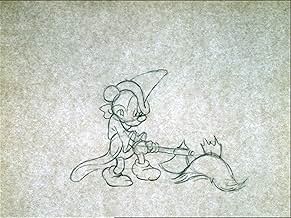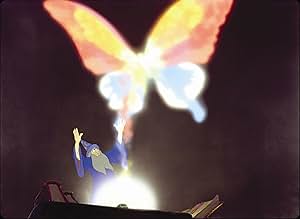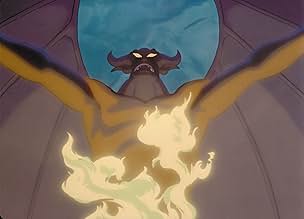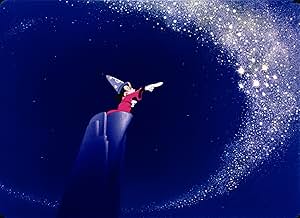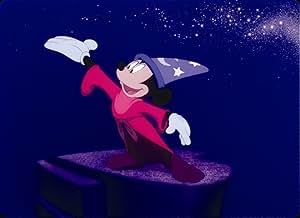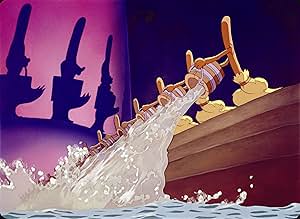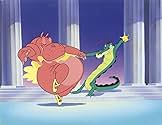Fantasia
- 1940
- Tous publics
- 2h 4min
Une suite de huit dessins animés illustrant de grands morceaux de musique classique.Une suite de huit dessins animés illustrant de grands morceaux de musique classique.Une suite de huit dessins animés illustrant de grands morceaux de musique classique.
- Récompenses
- 9 victoires et 1 nomination au total
Corey Burton
- Narrator: Deems Taylor overdubs (2000 restoration)
- (voix)
- (non crédité)
Walt Disney
- Mickey Mouse (segment 'The Sorcerer's Apprentice')
- (voix)
- (non crédité)
Hugh Douglas
- Narrator (1982 version)
- (voix)
- (non crédité)
James MacDonald
- Percussionist
- (non crédité)
Tim Matheson
- Narrator (1985 version)
- (voix)
- (non crédité)
Julietta Novis
- Soloist (segment 'Ave Maria')
- (voix (chant))
- (non crédité)
Paul J. Smith
- Violinist
- (non crédité)
Avis à la une
This unusual and very creative classic of animation combines a very interesting idea with quite a bit of imagination, plus visual effects that still hold up quite well. All but a couple of the sequences are quite enjoyable, and some especially so. Even the segments that don't work as well are usually at least interesting, since you can at least appreciate what they were trying to accomplish.
You don't really have to be all that familiar with the specific pieces of music for it to be worthwhile, since in several cases they chose to match the music with material that is rather different in nature from any original context that it may have had. And in any case, the animated sequences are intended to provide the context, in terms of the movie.
No doubt, everyone will have his or her own favorite segments, based on the music itself and on the choice of accompanying visual material. The "Sorcerer's Apprentice" sequence, with Mickey Mouse, is certainly one of the most memorable. The adaptation of "The Rite of Spring" is quite imaginative in using an entirely different setting for the music. "Night on Bald Mountain" has striking and sometimes bizarre visuals.
Many of the classic Disney features still hold up well as family entertainment, but "Fantasia" is unique for its combination of imaginative concept and visual creativity. Not every minute of it works, but that's the price of being willing to experiment. It's an enjoyable and satisfying feature that well deserves to be remembered.
You don't really have to be all that familiar with the specific pieces of music for it to be worthwhile, since in several cases they chose to match the music with material that is rather different in nature from any original context that it may have had. And in any case, the animated sequences are intended to provide the context, in terms of the movie.
No doubt, everyone will have his or her own favorite segments, based on the music itself and on the choice of accompanying visual material. The "Sorcerer's Apprentice" sequence, with Mickey Mouse, is certainly one of the most memorable. The adaptation of "The Rite of Spring" is quite imaginative in using an entirely different setting for the music. "Night on Bald Mountain" has striking and sometimes bizarre visuals.
Many of the classic Disney features still hold up well as family entertainment, but "Fantasia" is unique for its combination of imaginative concept and visual creativity. Not every minute of it works, but that's the price of being willing to experiment. It's an enjoyable and satisfying feature that well deserves to be remembered.
This without a doubt the greatest animated film in history. While highly acclaimed and well-known today, it was not terribly popular when it was first released. The idea of "Fantasia" is to take great pieces of music and draw animated sequences that match them. In doing so, it reverses the purpose of a movie's score; the movie serves and matches the music, not the other way around. This set up also means that there is no typical formula plot that is present in the vast majority of movies. In the first piece, the animation is vague and abstract, but in later ones it is of definite actions, objects, and stories. The two most famous(and my favorite) parts are probably "The Sorcerer's Apprentice" and "Rite of Spring". "Fantasia" is not only the best animated film ever made, but one of the greatest films period.
In 1940, Walt Disney released "Fantasia", the third feature of his studio and maybe his most ambitious project, with a beautiful combination of classical music conducted by Leopold Stokowski and animation. The result is a movie that has been worshiped by every generation.
Yesterday I saw "Fantasia" again, now on the Special 60th Anniversary Edition DVD, restored and remastered with audio in THX inclusive with intermission. The program, for those that have eventually never seen or want to recall, is composed by the following:
(1) Toccata and Fugue in D Minor by Johann Sebastian Bach.
(2) Nutcracker Suite by Pyotr Ilyich Tchaikovsky.
(3) The Sorcerer's Apprentice by Paul Dukas.
(4) Rite of Spring by Igor Stravinsky.
(5) Intermission/Meet the Soundtrack.
(6) The Pastoral Symphony by Ludwig van Beethoven.
(7) Dance of the Hours by Amilcare Ponchielli.
(8) Night on Bald Mountain by Modest Mussorgsky.
(9) Ave Maria by Franz Schubert.
My vote is eight.
Title (Brazil): "Fantasia"
Yesterday I saw "Fantasia" again, now on the Special 60th Anniversary Edition DVD, restored and remastered with audio in THX inclusive with intermission. The program, for those that have eventually never seen or want to recall, is composed by the following:
(1) Toccata and Fugue in D Minor by Johann Sebastian Bach.
(2) Nutcracker Suite by Pyotr Ilyich Tchaikovsky.
(3) The Sorcerer's Apprentice by Paul Dukas.
(4) Rite of Spring by Igor Stravinsky.
(5) Intermission/Meet the Soundtrack.
(6) The Pastoral Symphony by Ludwig van Beethoven.
(7) Dance of the Hours by Amilcare Ponchielli.
(8) Night on Bald Mountain by Modest Mussorgsky.
(9) Ave Maria by Franz Schubert.
My vote is eight.
Title (Brazil): "Fantasia"
I first remember hearing about this movie when I was very little, and ever since I first watched it on VHS, it has always been one of the many examples of my favorite movies of all time. This is so unique, because unlike a typical Disney movie, in this movie we do not hear any dialog from the characters, and all of the music is instrumental (except for "Ave Maria" at the end). The film is divided into eight sequences, each of them being introduced by a guy named Deems Taylor, who was a very well-known music critique.
The eight segments are as follows:
1.) "Tocatta & Fugue in D-minor" composed by Johanne Sebastian Bach. This segment consists of shots of the Philadelphia Orchestra and their conductor Leopold Stokowski with a lot of cool shadow and color effects during the first three minutes, then we see a lot of shapes and random objects that Taylor would suggest to us might pop into our brains when listening to the music.
2.) "The Nutcracker Suite" composed by Tchaikovsky. In this part of the movie, we listen to excerpts of the famous ballet suite, and we see various fairies, flowers, fish and other nature-related creatures.
3.) Everyone's favorite "The Sorcerer's Apprentice" starring Sorcerer Mickey and Yen Sid (the sorcerer whose name is "Disney" spelled backwards). This is also the only segment to be seen again in this film's sequel, "Fantasia/2000" 60 years later, and in it the apprentice brings to life a magical broomstick to try to fill a cauldron with water, and the spell goes wrong so the apprentice gets reprimanded. This is then followed by Mickey greeting conductor Stokowski.
4.) "Rite of Spring" composed by Igor Stravinsky. This segment takes place billions and billions of years ago with the coming of the dinosaurs, where we see the creation of Earth in the beginning of time, and are later introduced to all of the different dinosaurs including the tyrannosaurus rex, which become extinct in the end of the segment.
5.) "Intermission/Meet the Soundtrack". At this point in the film, Deems Taylor introduces this string thingamajigger called the "Soundtrack" that he asks to make a lot of sounds resembling various instrument sounds.
6.) "Pastoral Symphony No. 6" composed by Beethoven. This segment is about a day in the countryside, and in it we see a lot of Greek mythology creatures like unicorns, satyrs, centaurs and centaurettes, cupids, Bacchus, Zeus, Iris, Apollo and Diana.
7.) "Dance of the Hours". This is where we see dancing ostriches, alligators, elephants and hippos. Each part of the piece suggests different hours of the day, and it all ends with a triumphant finale where the dancing hippo takes center stage.
8.) A combination of two pieces that are utterly different in mood and tone. They are "Night on Bald Mountain" in which a bat villain named Chernabog has Satan's evil spirits dance furiously until the coming of the sacred dawn, and then Franz Schubert's "Ave Maria" which is the one and only part of the whole film in which we hear lyrics sung, and then the movie ends.
I simply must say that not only is this film one of my all time favorite animated masterpieces, but it is also an example of a big highlight of the 1940's in cinematic history, all because of the ways it is so unique and special. In addition to this masterpiece, I also think "The Wizard of Oz", "Gone with the Wind", "Citizen Kane" and "Casablanca" are main icons of cinematic successes. I definitely think this should have been the first animated movie to be nominated for the Best Picture Academy Award instead of "Beauty and the Beast".
The eight segments are as follows:
1.) "Tocatta & Fugue in D-minor" composed by Johanne Sebastian Bach. This segment consists of shots of the Philadelphia Orchestra and their conductor Leopold Stokowski with a lot of cool shadow and color effects during the first three minutes, then we see a lot of shapes and random objects that Taylor would suggest to us might pop into our brains when listening to the music.
2.) "The Nutcracker Suite" composed by Tchaikovsky. In this part of the movie, we listen to excerpts of the famous ballet suite, and we see various fairies, flowers, fish and other nature-related creatures.
3.) Everyone's favorite "The Sorcerer's Apprentice" starring Sorcerer Mickey and Yen Sid (the sorcerer whose name is "Disney" spelled backwards). This is also the only segment to be seen again in this film's sequel, "Fantasia/2000" 60 years later, and in it the apprentice brings to life a magical broomstick to try to fill a cauldron with water, and the spell goes wrong so the apprentice gets reprimanded. This is then followed by Mickey greeting conductor Stokowski.
4.) "Rite of Spring" composed by Igor Stravinsky. This segment takes place billions and billions of years ago with the coming of the dinosaurs, where we see the creation of Earth in the beginning of time, and are later introduced to all of the different dinosaurs including the tyrannosaurus rex, which become extinct in the end of the segment.
5.) "Intermission/Meet the Soundtrack". At this point in the film, Deems Taylor introduces this string thingamajigger called the "Soundtrack" that he asks to make a lot of sounds resembling various instrument sounds.
6.) "Pastoral Symphony No. 6" composed by Beethoven. This segment is about a day in the countryside, and in it we see a lot of Greek mythology creatures like unicorns, satyrs, centaurs and centaurettes, cupids, Bacchus, Zeus, Iris, Apollo and Diana.
7.) "Dance of the Hours". This is where we see dancing ostriches, alligators, elephants and hippos. Each part of the piece suggests different hours of the day, and it all ends with a triumphant finale where the dancing hippo takes center stage.
8.) A combination of two pieces that are utterly different in mood and tone. They are "Night on Bald Mountain" in which a bat villain named Chernabog has Satan's evil spirits dance furiously until the coming of the sacred dawn, and then Franz Schubert's "Ave Maria" which is the one and only part of the whole film in which we hear lyrics sung, and then the movie ends.
I simply must say that not only is this film one of my all time favorite animated masterpieces, but it is also an example of a big highlight of the 1940's in cinematic history, all because of the ways it is so unique and special. In addition to this masterpiece, I also think "The Wizard of Oz", "Gone with the Wind", "Citizen Kane" and "Casablanca" are main icons of cinematic successes. I definitely think this should have been the first animated movie to be nominated for the Best Picture Academy Award instead of "Beauty and the Beast".
Fantasia was to be the crowning achievement of Walt Disney Studios, their magnum opus, a work of art that finally convinced the people that animated films could be more than "mere" children's entertainment. Unfortunately, it was too much too soon. People went in expecting children's entertainment - after all, that's what Disney was known for - and instead were treated to high art. Nothing wrong with that, but you need to expect it first. And thus, Fantasia flopped financially, and what was meant to be a continuing series of films, remained just one until the turn of the century.
But oh what a film it is. Music by the best classical composers ever lived, performed by the Philadelphia Orchestra, hosted by Deems Taylor, featuring some the finest animated segments Disney had ever done. It's a stone cold classic, was from the very first moment, and it's a shame it didn't do so well. Luckily it has gone down in history as one of Disney's finest and will be watched and appreciated for centuries to come.
As for the individual segments, they're not of equal quality, though they are all very good in their own ways.
The opening segment, Toccata and Fugue in D Minor, is not one of my personal favourites, but it works as a good opening intro to the idea behind Fantasia and is pretty to look at in its own way. It hasn't aged as well as some of the other segments, but it does its job more than adequately.
Nutcracker Suite, on the other hand, is fantastic. Beautiful images, perfectly accompanied by one of the most recognizable pieces of music there is. After seeing this segment once, it's hard not to see fairies and seasons dancing around whenever you hear the piece.
And then there's The Sorcerer's Apprentice. Everyone knows this one and has most probably seen it, even if they haven't seen the whole film. It's the segment with the most story and is one of the strongest Mickey Mouse shorts ever made. Grandeur, funny and even a bit threatening, it's probably the film's strongest moment.
Rite of Spring is another one with a story, this time about the history of our small blue orb floating in the space. It's intriguing to watch, but once again the animation shows a bit of its age and it's perhaps even a little bit too ambitious for its running length. Not the strongest segment, but once again very good nonetheless.
The Pastoral Symphony and Dance of the Hours, the next two segment, are to me very similar and while they're both fine, I cannot admit to liking them all that much. They're mostly just general gallivanting and while that's fine and fits the music, it can become a bit boring. The Pastoral Symphony is also the segments that has aged the least gracefully with some really rough character designs.
Luckily we have Night on Bald Mountain and Awe Maria to close the film. And they are awe-inspiring. The devil on his lone mountain top is one of the scariest images Disney has ever produced and the rest of the segment is equally haunting, eerie and threatening. Which is why the following tranquility and quietness of Awe Maria works so well and allows you to drift over the finish line with a smile on your face and peace in your heart.
Fantasia is not a perfect film, but it's still one of the finest pieces of art I've ever seen and a perfect introduction to animated films meant for adults. As a child I found it slightly boring. As an adult I'm in awe.
But oh what a film it is. Music by the best classical composers ever lived, performed by the Philadelphia Orchestra, hosted by Deems Taylor, featuring some the finest animated segments Disney had ever done. It's a stone cold classic, was from the very first moment, and it's a shame it didn't do so well. Luckily it has gone down in history as one of Disney's finest and will be watched and appreciated for centuries to come.
As for the individual segments, they're not of equal quality, though they are all very good in their own ways.
The opening segment, Toccata and Fugue in D Minor, is not one of my personal favourites, but it works as a good opening intro to the idea behind Fantasia and is pretty to look at in its own way. It hasn't aged as well as some of the other segments, but it does its job more than adequately.
Nutcracker Suite, on the other hand, is fantastic. Beautiful images, perfectly accompanied by one of the most recognizable pieces of music there is. After seeing this segment once, it's hard not to see fairies and seasons dancing around whenever you hear the piece.
And then there's The Sorcerer's Apprentice. Everyone knows this one and has most probably seen it, even if they haven't seen the whole film. It's the segment with the most story and is one of the strongest Mickey Mouse shorts ever made. Grandeur, funny and even a bit threatening, it's probably the film's strongest moment.
Rite of Spring is another one with a story, this time about the history of our small blue orb floating in the space. It's intriguing to watch, but once again the animation shows a bit of its age and it's perhaps even a little bit too ambitious for its running length. Not the strongest segment, but once again very good nonetheless.
The Pastoral Symphony and Dance of the Hours, the next two segment, are to me very similar and while they're both fine, I cannot admit to liking them all that much. They're mostly just general gallivanting and while that's fine and fits the music, it can become a bit boring. The Pastoral Symphony is also the segments that has aged the least gracefully with some really rough character designs.
Luckily we have Night on Bald Mountain and Awe Maria to close the film. And they are awe-inspiring. The devil on his lone mountain top is one of the scariest images Disney has ever produced and the rest of the segment is equally haunting, eerie and threatening. Which is why the following tranquility and quietness of Awe Maria works so well and allows you to drift over the finish line with a smile on your face and peace in your heart.
Fantasia is not a perfect film, but it's still one of the finest pieces of art I've ever seen and a perfect introduction to animated films meant for adults. As a child I found it slightly boring. As an adult I'm in awe.
Le saviez-vous
- AnecdotesDuring production, the animators were given no instructions for coloring. Walt Disney instructed them to use any colors they wanted, which was a first.
- GaffesWhen introducing the "Pastoral" sequence, Deems Taylor mixes Greek and Roman names of deities: Bacchus, Vulcan and Diana are Roman; Zeus, Iris and Morpheus are Greek. Apollo is the only one whose Greek and Roman equivalents have the same name.
- Citations
Mickey Mouse: [Pulling on Stokowski's coat] Mr. Stokowski! Mr. Stokowski!
[Mickey whistles to get Stokowski's attention]
Mickey Mouse: My congratulations, sir!
Leopold Stokowski: [shaking hands with Mickey] Congratulations to you, Mickey!
Mickey Mouse: Gee, thanks! Hehe! Well, so long! I'll be seeing ya!
Leopold Stokowski: Goodbye!
- Crédits fousThere are no closing credits of any kind. Not even the words "THE END" appear on the screen.
- Versions alternativesBefore the 1990 re-release, the film was shown with no credits other than the title and the RKO logo. Leopold Stokowski received a written credit only on the posters advertising the film. In the film's original roadshow release, not even the title was shown at the beginning of the film - that was saved for the intermission break.
- ConnexionsEdited into Un monde est né (1955)
- Bandes originalesToccata and Fugue in D Minor, BWV 565
Composed by Johann Sebastian Bach
Orchestrated by Leopold Stokowski (uncredited)
Played by The Philadelphia Orchestra
Conducted by Leopold Stokowski
Meilleurs choix
Connectez-vous pour évaluer et suivre la liste de favoris afin de recevoir des recommandations personnalisées
Détails
Box-office
- Budget
- 2 280 000 $US (estimé)
- Montant brut aux États-Unis et au Canada
- 76 408 097 $US
- Week-end de sortie aux États-Unis et au Canada
- 980 798 $US
- 10 févr. 1985
- Montant brut mondial
- 76 414 517 $US
- Durée
- 2h 4min(124 min)
- Couleur
- Mixage
- Rapport de forme
- 1.37 : 1
Contribuer à cette page
Suggérer une modification ou ajouter du contenu manquant





